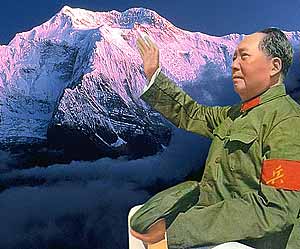08.05.2008
May 06, 2008 (the date of publication in Russian)
Alexei Chichkin
THE GREAT HELMSMAN CONQUERS THE EVEREST
After the Maoist victory, Nepal to turn its back towards India and its face to China
 The outcome of the national elections in Nepal will enable local Maoists to fulfill their promise to install the statues of Karl Marx, Joseph Stalin and Mao Zedong on the top of Chomolungma (Everest), the highest world’s mountain situated at the country’s border with China. The triumph of the Maoist party is commonly qualified as a strategic success of Beijing in Southern Asia.
The outcome of the national elections in Nepal will enable local Maoists to fulfill their promise to install the statues of Karl Marx, Joseph Stalin and Mao Zedong on the top of Chomolungma (Everest), the highest world’s mountain situated at the country’s border with China. The triumph of the Maoist party is commonly qualified as a strategic success of Beijing in Southern Asia.
In the north, Nepal borders with Tibet, and in the south-west, only 180 kilometers sever the country from New Delhi. This localization determines Nepal’s significance for the foreign policy of China, India, Pakistan, as well as the Western imperial powers, primarily the United States and the United Kingdom. The Himalayan stronghold has thus become a major prize in the Chinese geopolitical game.
It is noteworthy that right after the victory of the Maoists, the official Beijing concentrated not on inter-state but rather on inter-party relations with Katmandu. A working group of CPC Central Committee promptly arrived in Nepal’s capital to establish relations with the “fraternal” Nepalese party that had just acquired a legal status. The Chinese delegation met with the members of the Government and with the leadership of the parliament of Nepal, demonstratively neglecting the king whom China has grounds to regard as a political corpse.
The success of the Maoists made the elimination of the Nepalese monarchy inevitable. Pushpa Kamal Dahal (Prachanda), the leader of the Communist (Maoist) Party of Nepal, insists that King Gyanendra voluntarily leave his palace. In case of his reluctance, the monarchy is going to be declared non-existent at the first meeting of the Constituent Assembly. Prachanda is going to become the first President for the country, which requires revision of the national Constitution on the base of a national consensus.
The Nepalese monarchy had been rapidly losing popularity during recent years. King Gyanendra was regarded as responsible for the massacre in the royal palace that happened in 2001. At that time, Prince Dipendra, the brother of the king, gunned down most of the royal family, including his father, King Birendra. The later attempts of the incumbent king to oppress the Maoist insurgency with police measure resulted in a massive defection of officers and soldiers of the royal army to the guerillas, while the opposition lined up behind the Maoist party, as the most capable oppositionist anti-monarchic force.
At the same time, Asian media indicate that the triumph of the pro-Beijing forces in Nepal reflects the long-time dream of the Nepalese to get rid of the vassal dependence from India that was imposed upon the country after the withdrawal of the British troops from the subcontinent. Prachanda had already demanded to abrogate the Treaty on Peace and friendship with India, introduced in 1950. He believes that the treaty is outdated and should be replaced with a new one, reflecting the reality of today. "We also pursue revision of all other agreements with India", he adds. In particular, these agreements suggest coordination of Nepal’s financial, informational and immigration policy with India.
New Delhi has already agreed to start negotiations with the new Nepalese government. However, the Maoists suspect that the Hindu may select an aggressive approach and even undertake a military intervention in order to spark Nepal’s disintegration into a number of autonomies in order to later integrate them into India, as it happened with the Princedom of Sikkim back in 1975.
Prachanda has already promised to act “accurately and resolutely”, in order to prevent "Sikkimization" and "Afghanization" of his country. The concerns of the Maoist leader are justified, regarding the obvious efforts of the United States to use the conflict in order to drag India into an anti-Chinese pact.
In its turn, New Delhi fears that the example of Nepal could be followed by one more Himalayan kingdom, Bhutan. The anti-monarchist Bhutanese National Congress has greeted the intention of the Nepalese leftists to depose the King and to distance their country from India. In case the Chinese People’s Republic gains control over both Nepal and Bhutan, the issue of Sikkim, where an underground oppositionist alliance is fighting already for thirty years, may be raised as well. It is noteworthy that thousands of Maoists operate across the territory of India, controlling lots of villages and rural communities.
Meanwhile, China is conquering the region not only with political but also with economic means. The project of a direct railway transport link between Nepal and China across the Autonomous Region of Tibet, as a part of the presently constructed Qinghai-Tibet railroad, is being discussed along with unification of electricity networks of Nepal, Myanmar and China.
Number of shows: 1080
 ENG
ENG 

 ENG
ENG 
